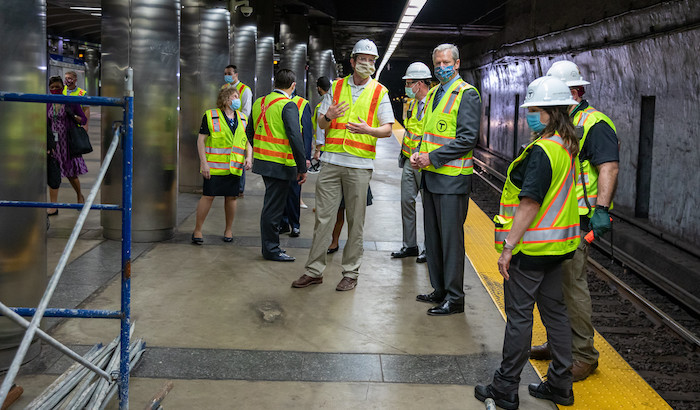As the trains broke down, the MBTA’s million-dollar marketing campaign kept working

Payments to politically connected company for positive safety messaging continued through multiple transit calamities
In 2019, a politically connected state contractor presented a series of messages and ideas for his Massachusetts Bay Transportation Authority clients in what was dubbed their “MBTA Brand Creative Presentation.”
Big concepts like “Performance Improvement” and “Fiscal Discipline” have been broken down into goals, situations, and facts to channel into messaging opportunities for the T.
For “budgetary discipline”, the objective was to “clarify to [the] public, we don’t waste the money. While a situation in which the “perception” emerges that the “MBTA will waste money” on “hackers” could be met with facts via “data on [the agency’s] balanced budget.”
“Security” was the first item on the list. The objective in this category: “To be a very safe system”. The situation: “If we’re not safe…nothing else matters…very safe system.
For “security” facts, the presentation simply noted “to be determined.”
Security doesn’t cross that line much in the 2019 presentation of the Boathouse Group, a Waltham-based consultancy that has been awarded nearly $3 million for being the MBTA’s “go-to marketing agency” for the past four months. years. After nearly a year without using Boathouse, the MBTA began writing checks to the company in November 2021 and has since paid them more than $600,000, records show.
MBTA officials said Boathouse was tapped for a bus driver recruitment drive and to support the agency’s ‘Take the T’ marketing, which was designed to bring passengers back after the sharp drop in ridership caused by the COVID-19 pandemic. Those payments started again after several months of high-profile crashes, derailments, malfunctions and a death, which drew heavy criticism for the MBTA and Governor Charlie Baker.
And now the T and the governor who promised to handle it face even tougher scrutiny, including a federal investigation following the dragging death of a passenger at a Red Line station earlier this year. . Meanwhile, state lawmakers are considering extending the T a massive line of credit to make much-needed safety upgrades.
But the T has also been willing to spend to improve its image, as opposed to its reality. Some transit advocates said they favor better marketing, but others said the MBTA needs to spend on safety.
“As a daily transit rider, there’s nothing more frustrating than feeling like my transit dollars and tax dollars aren’t being spent in a way that makes the MBTA safer and more reliable,” said said Chris Dempsey, candidate for state auditor and former director of transportation for Massachusetts. “As state auditor, I will ensure that every dollar spent by MBTA is put to good use so that my fellow commuters have a better experience tomorrow than they do today.”

Connections
The MBTA signed a contract with Boathouse for a maximum payment of $5.5 million in 2018. In their response to the marketing services offer, Boathouse executives bragged about their work for Eversource and told officials of T, “We respect and appreciate your commitment to listening to passengers and measuring your success against the customer experience, while navigating the intense pressures of operational maintenance, expansion and growth. We understand the importance of nuance in tone and audience messaging in this industry. »
Boathouse’s pitch to “humanize the brand” was one of many from businesses in the area, but the Waltham-based agency had a connection that others didn’t. Boathouse was co-founded and is run by CEO John Connors, the son of longtime Boston power broker, marketer and Hill Holiday founder Jack Connors, who as his son’s company bid for the marketing position, became chairman of Baker’s re-election campaign. After his father took over running Baker’s campaign, John Connors donated $1,000 to Baker’s campaign, as did Boathouse manager Robert Parks, while Boathouse co-founder and chief financial officer Christopher Boland , donated $5,000 to the Republican State Committee.
Boathouse started getting paid in 2019”develop and execute a comprehensive marketing and communications plan to support the Authority’s efforts to engage with our customers and stakeholders, as well as to support the development of the MBTA brand and key marketing initiatives,” between others. When the The Boston Institute for Nonprofit Journalism originally wrote about Boathouse in 2020 and requested materials outlining the marketing campaigns the agency had produced after a year of work, the MBTA sent more than two things: the aforementioned brand’s creative pitch and a series of advertising proposals for the agency’s text alerts. ‘agency. By then, Boathouse had been paid nearly $1.5 million.
The 14 proposed slogans included: “No more ETA. Less WTF”; “The fastest way to learn why things are slow”; and, “Think of it as a ‘decommissioned’ service.” The creative presentation includes additional proposed marketing materials, such as posters and slogans highlighting the investment in the T and “a brighter future for the MBTA and all the people and communities we serve.”
“We believe that providing the people of the Commonwealth with a safe and reliable public transport system is our primary responsibility. And that reliability leads to opportunities,” the presentation reads in part. “Our primary marketing objective is to enhance the image of the MBTA, both from a credibility standpoint and preferably in the hearts and minds of the people we serve: riders, employees, elected officials and the media. … We have to take a position that is hard for people to argue against.

Reopening of the checkbook
The MBTA paid Boathouse more than $800,000 in 2020, according to public records. But for most of 2021, the agency didn’t write any checks to its official marketing agency. That changed with eight payments totaling over $200,000 at the end of last November, followed by a $160,000 payment a few weeks later. The MBTA has paid Boathouse more than $620,000 since those payments, with the last check cut March 31.
Payments to Boathouse have resumed after derailments, an elevator malfunction and a death at a T station led to heightened security scrutiny at the agency over the past year. Last July, two Green Line carts crashed near Boston University, sending more than 25 people to hospital and sparking a criminal investigation by the Suffolk District Attorney’s Office. A dozen more people were injured after an escalator at Back Bay station malfunctioned and began to roll back in September.
A Red Line train derailed at Broadway station in September, and in October, aAnother Green Line trolley has derailed. Also in September, BU professor David Jones died after falling down an unrepaired staircase at JFK/UMass station.
At the time, Baker insisted that “the MBTA is safe,” according to the State House News Service. But since then, the Federal Transit Administration has launched its own investigation into the T after the dragging death of Robinson Lalin after the subway doors closed on his arm at Broadway station in March, coinciding with more derailments, collisions and runaway trains.
MBTA spokeswoman Lisa Battison said Boathouse continues to be the T’s official marketing agency, and said the group was recently paid to provide marketing support and creative materials for the T’s campaign. T to recruit bus drivers. The company has also been working to encourage cyclists to start riding the T again as COVID numbers drop and safety concerns about the T increase.
“In 2021, Boathouse supported the MBTA’s ‘Take the T’ campaign, which both urged people to return to the MBTA as COVID waned, and which thanked and recognized riders who used the T throughout of the pandemic, including Boston’s frontline workforce. The campaign “encouraged people to get out of their cars and back onto the T,” Battiston wrote in a statement. “Creative was featured at gas stations (due to rising gas prices), on highway billboards, and on the radio. This effort was complemented by new fare products that gave hybrid workers more choices when choosing how to pay their fare. This campaign also featured destinations that people can visit through T-Franklin Park, Revere Beach, the Aquarium, and Fenway were featured, among others.
Stacy Thompson of LiveableStreets Alliance said the T should actually spend more money on marketing to give riders better information and encourage use.
“The T should spend much, much more on communications. Compared to other transit authorities, the T spends significantly less on marketing,” Thompson said. “That’s probably why the public feels like they’re not getting the information they need.”
The lawyer added: “There is a real role for marketing…you want to use marketing companies to demystify things for the public. It’s a good question whether Boathouse is the right company.
Boathouse did not respond to a request for comment.



